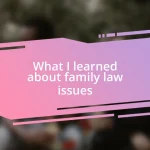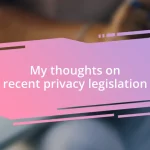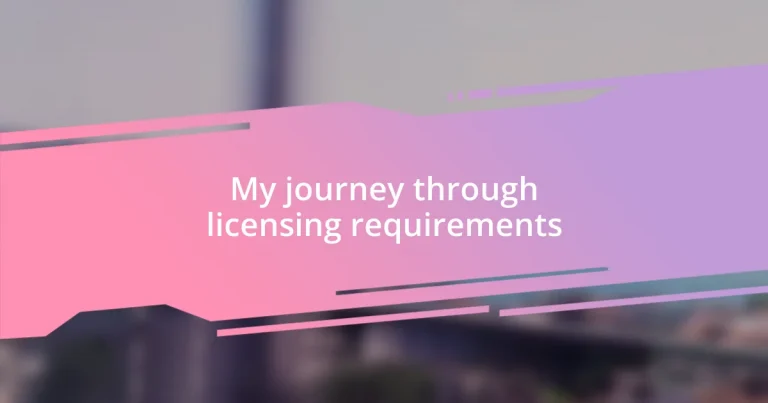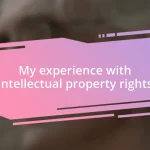Key takeaways:
- Understanding licensing basics is crucial as it serves to protect consumers and ensures professionals meet industry standards.
- Identifying specific licensing needs requires thorough research, consultation with experienced peers, and staying updated on regulations.
- Post-licensing responsibilities include compliance with ongoing education and ethical obligations, emphasizing the importance of integrity and continual learning in professional development.
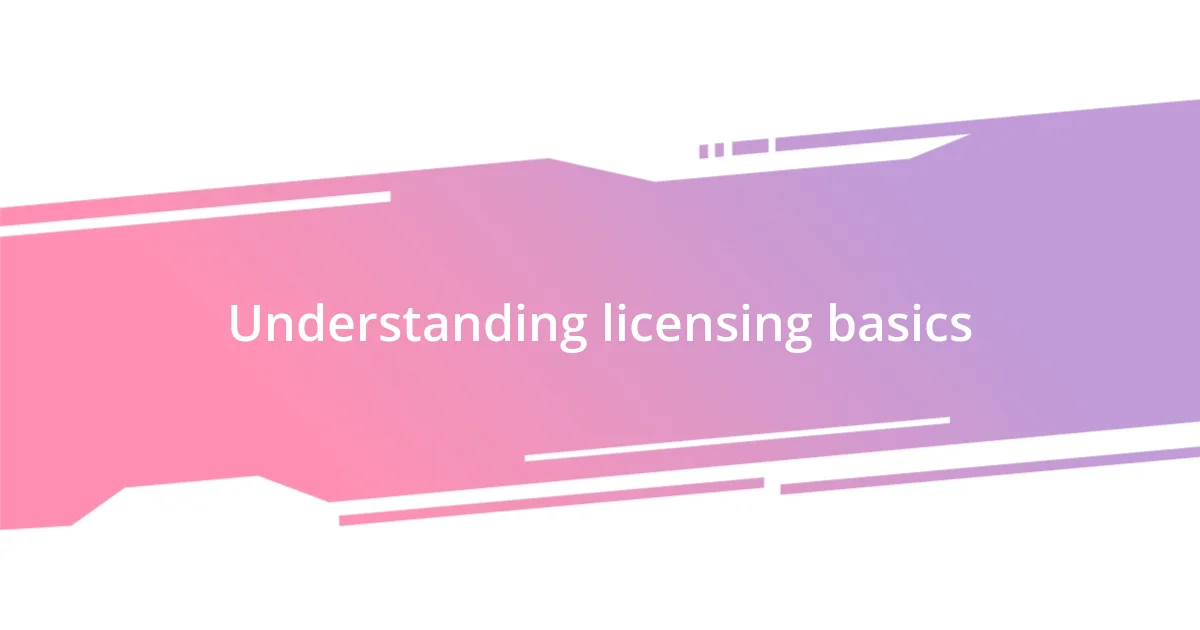
Understanding licensing basics
Licensing can feel like a maze at first, can’t it? I remember my initial encounter with the licensing process—each requirement seemed more daunting than the last. It’s essential to grasp that licensing serves a greater purpose: protecting consumers and ensuring professionals meet specific standards.
One thing I learned along the way is that each industry has its own nuances when it comes to licensing. For instance, while some fields may demand extensive background checks, others might require a simple exam. Reflecting on my journey, the variety can be overwhelming, but it also highlights the diversity of professional paths available to us.
Navigating through these requirements often involves sifting through a lot of paperwork, and I found that keeping organized made a significant difference. Have you ever felt lost in a sea of documentation? I often had to remind myself that patience was key. Understanding what is necessary helps demystify the process and transforms it from an obstacle into a clear pathway toward achieving my professional goals.
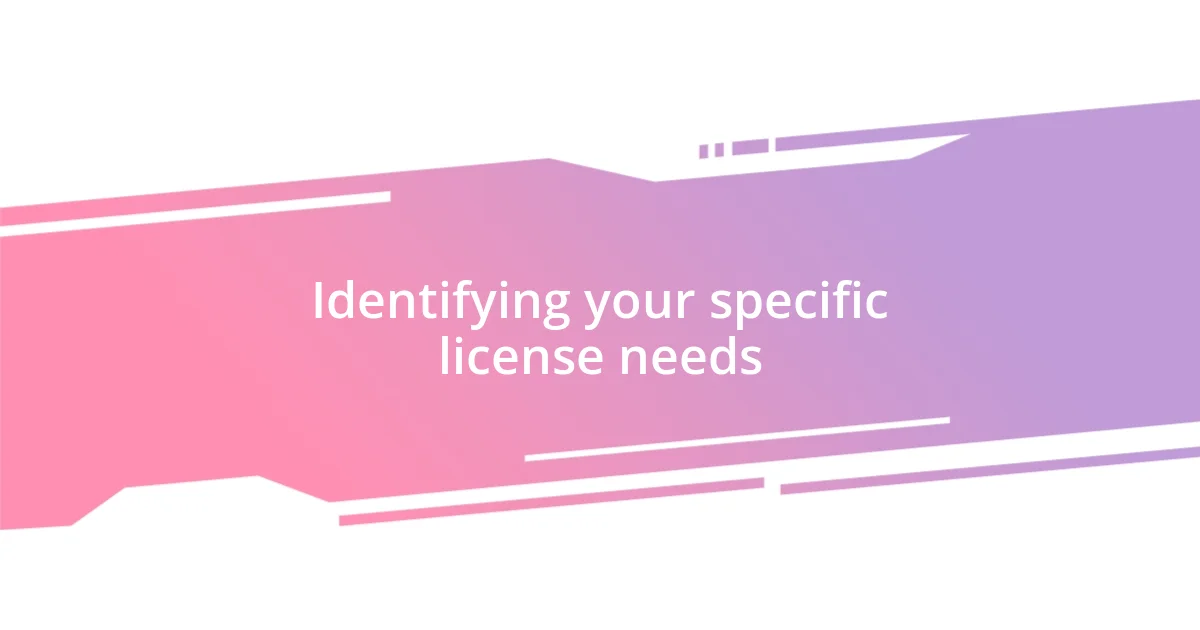
Identifying your specific license needs
When I first sat down to figure out what licenses I actually needed, my head was spinning. I remember researching late into the night, wondering if I was missing crucial requirements. It’s easy to feel overwhelmed, but breaking it down into manageable parts helped me significantly. Here are some steps to consider in identifying your specific license needs:
- Research your industry: Look into the standard licenses required for your profession.
- Consult professionals: Reach out to peers or mentors who have navigated similar paths.
- Check local regulations: Licensing often varies by state or region, so understand your local requirements.
- Identify your career goals: What do you want to achieve? Your aspirations can guide you in choosing the right license.
- Stay updated: Licensing can change, so keep yourself informed about the latest requirements.
Identifying license needs is akin to piecing together a puzzle. I vividly remember feeling like each piece had its own unique shape, not all of which seemed to fit the picture I had in my mind. But as I dug deeper and narrowed my focus, everything began to align. It’s all about clarity. Each completed piece of the puzzle took me a step closer to my goals, reigniting my motivation along the way.
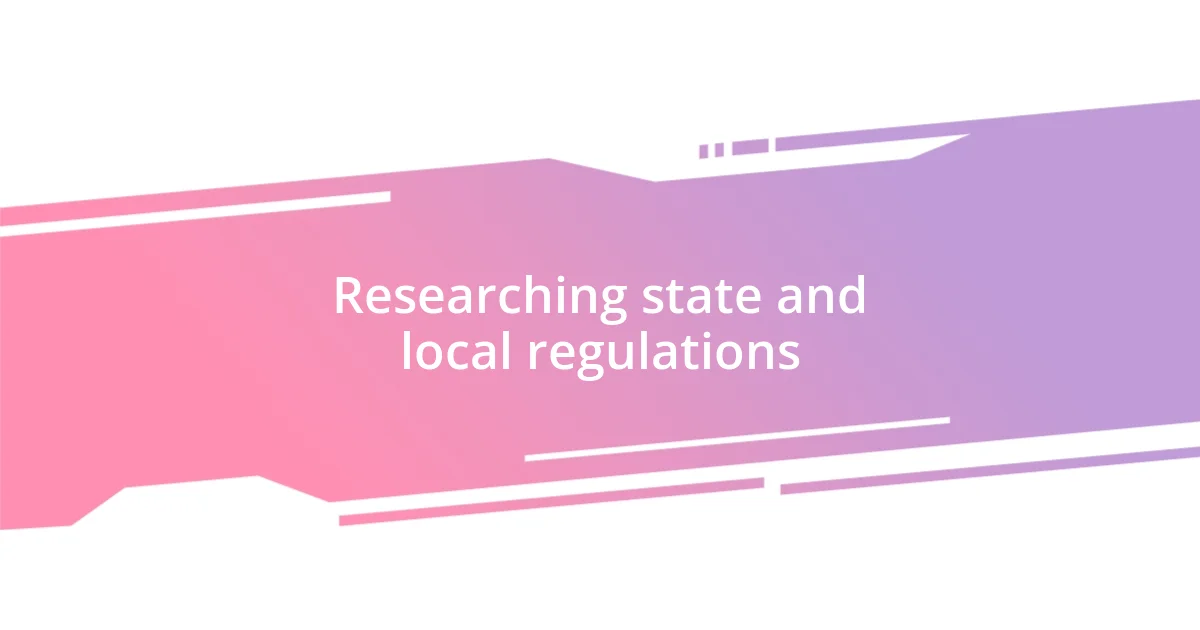
Researching state and local regulations
Researching the regulations at both state and local levels became one of my more enlightening experiences. I recall spending hours exploring different state websites, trying to decipher the convoluted legal jargon. At first, it felt like trying to read a manual for a spaceship, but eventually, I found that many states offer guidance documents that simplify the process. It’s essential to understand that while some regulations may align across states, others can vary greatly; it’s this nuance that holds significant importance in the licensing journey.
As I delved deeper, I realized that local regulations can be just as crucial as state requirements. I remember the moment I stumbled upon a local business forum where entrepreneurs shared their experiences. It was refreshing to hear real-world stories and advice tailored to my community. Engaging with local resources, like chambers of commerce or city business websites, provided clarity and inspired confidence. Have you ever found a hidden gem of information that significantly changed your approach? I certainly did, and it shifted the landscape of my research entirely.
Finally, I discovered that reaching out for direct support can drastically reduce overwhelm. I once scheduled a meeting with a licensing consultant after feeling lost in my findings. The few hours spent discussing the regulations saved me weeks of confusion and reinstilled my focus. Each conversation and piece of information I gathered felt like a step toward mastering the regulatory landscape. This journey teaches us that we don’t have to navigate alone; building a network can be incredibly beneficial.
| Regulation Type | Description |
|---|---|
| State Regulations | Set by state governments, these regulations often outline the core requirements for licensing in your industry. |
| Local Regulations | Specific to cities or counties, these can include additional requirements or guidelines for operating in that area. |
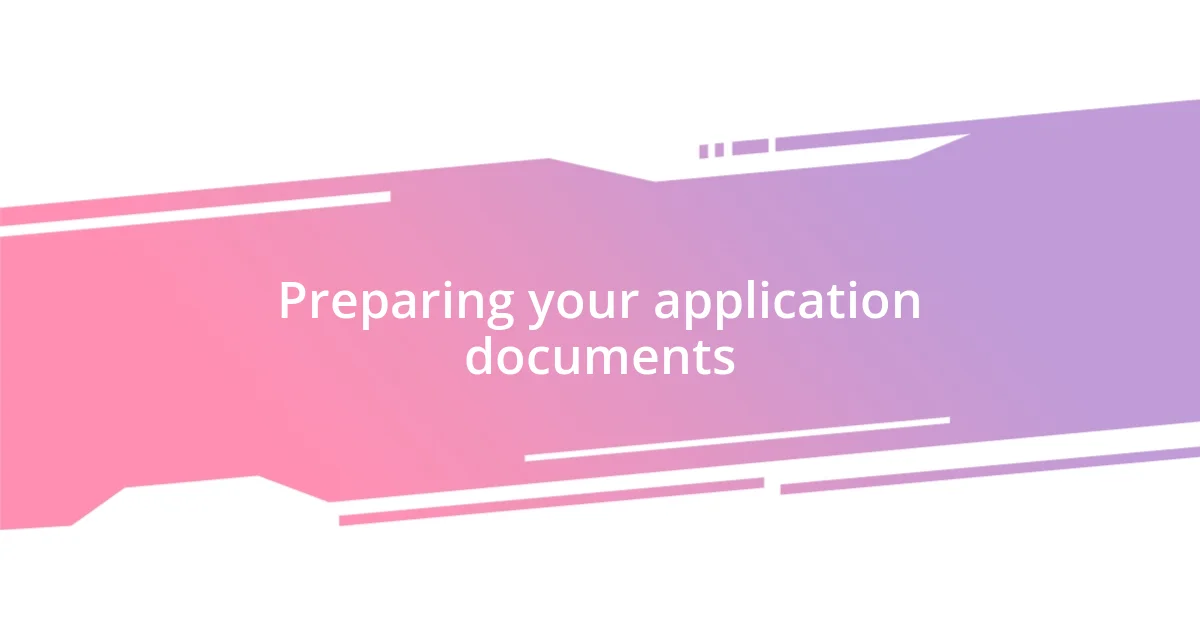
Preparing your application documents
Preparing application documents can often feel like a daunting task, but I found it to be a fascinating opportunity to showcase my journey. I vividly recall taking out an entire afternoon to craft my resume and cover letter. Each sentence felt like a reflection of my growth and determination. Did you ever find yourself rephrasing your achievements just to get the wording right? I did, and I realized that each word counts when it comes to making a solid first impression.
Assembling the necessary supporting documents, such as transcripts or proof of experience, is equally crucial. I remember the day I dug through old files to find my certificates. It felt like unearthing a treasure trove of my hard work. Having everything organized and easily accessible not only made the application process smoother but also gave me a chance to relive my accomplishments. There’s something empowering about seeing the tangible evidence of your efforts laid out in front of you, don’t you think?
Lastly, don’t underestimate the power of a well-prepared cover letter. I once spent hours refining mine, pouring my passion for the field into every paragraph. When I finally submitted it, I felt a wave of relief wash over me. It wasn’t just about applying; it was about sharing my story and showing how my journey aligned with the values of the organization. Crafting this personal narrative made me realize that your application documents aren’t just forms—they’re your professional story waiting to be told. How well are you telling yours?
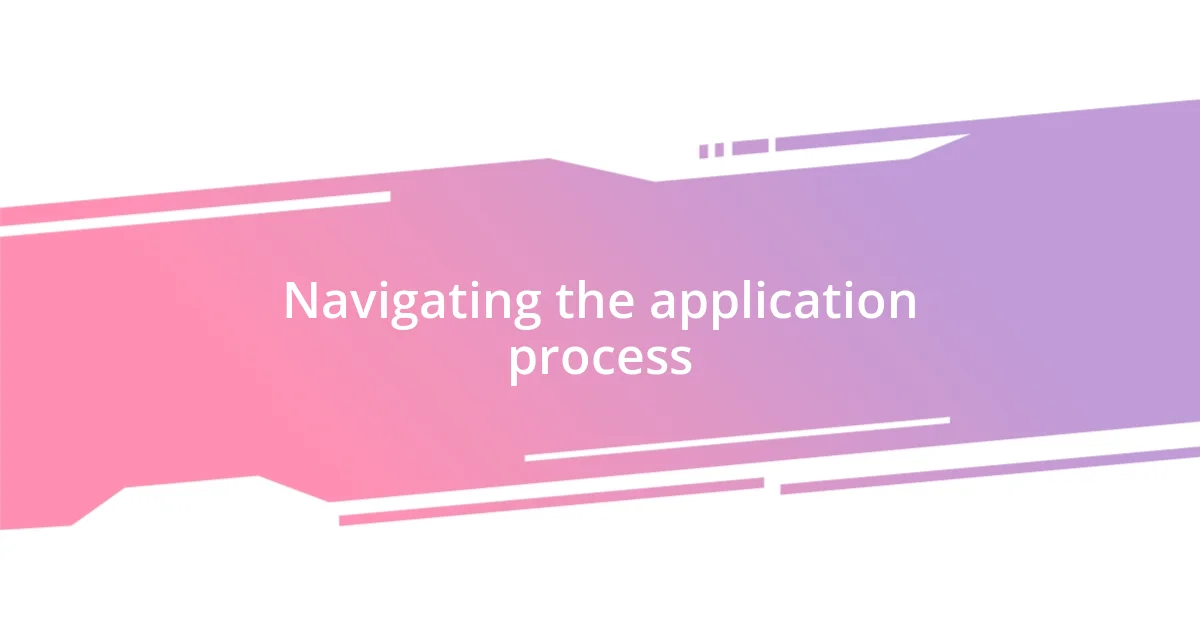
Navigating the application process
Navigating the application process can feel like an intricate dance of deadlines and requirements. I’ll vividly remember the day I sat down in front of my computer, coffee in hand, and created a detailed timeline of everything I needed to submit. It was like mapping out a treasure hunt, where each deadline felt like a stepping stone toward my goal. Have you ever felt overwhelmed by timelines? I certainly have. But breaking them into manageable sections transformed the chaotic puzzle into a more approachable task.
As I moved through the steps, I found that staying organized made all the difference. I developed a checklist with each item I’d need, such as forms, fees, and additional paperwork. It was satisfying to tick each box as I progressed, giving me a sense of achievement with every completed task. Have you ever had that rush of excitement when crossing something off your list? I can tell you that feeling is invigorating and serves as a reminder of your progress, especially in something as convoluted as licensing.
Reaching out to others for guidance during this phase was invaluable too. I remember connecting with a mentor who had successfully navigated the same process just a year prior. Their insights helped me avoid common pitfalls and gave me a different perspective on my application strategy. I began to realize how powerful it is to rely on others’ experiences. How often do you turn to your network for advice? It certainly made my application journey feel less isolating and infused it with a layer of support I hadn’t anticipated.
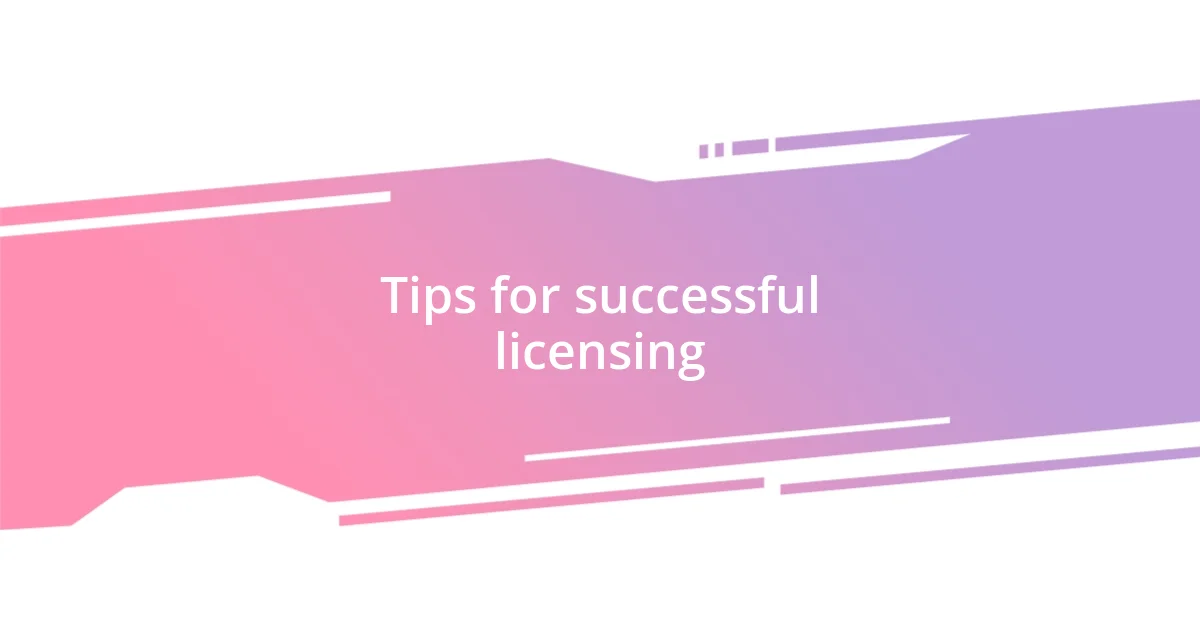
Tips for successful licensing
One significant tip for successful licensing is to double-check every requirement laid out by the licensing board. I distinctly remember a moment when I overlooked a minor detail, thinking it wouldn’t matter. That oversight cost me a delay in my application – a frustrating experience that taught me the value of meticulous attention. Have you ever underestimated a small requirement? I’ve learned that every checkbox matters, and ensuring that everything is complete can save you time and stress in the long run.
Embracing flexibility during the process is another crucial aspect. I often found that plans changed unexpectedly, whether it was a sudden request for additional documentation or a shift in submission deadlines. Instead of becoming overwhelmed, I embraced this uncertainty as part of the journey. One day, for instance, I needed to scramble to gather new forms just days before my submission. It was chaotic, but I learned to adapt quickly, and that resilience ultimately strengthened my resolve. Isn’t it interesting how challenges that initially seem daunting can lead to personal growth?
Finally, don’t forget the power of self-care during this intense period. I made a point to schedule short breaks and practice mindfulness when the stress felt a bit too much. Whether it was a short walk outside or some deep breathing exercises, these moments became essential in maintaining my focus. I remember feeling so rejuvenated after stepping away for just a few minutes. How do you take care of yourself during challenging times? Balancing the pressure of licensing with moments of self-care not only kept me grounded but also allowed me to approach my work with a clearer mind.

Post-licensing responsibilities and compliance
After obtaining my license, the responsibilities didn’t just vanish. The shift towards compliance became my new focus. I vividly recall the day I received my license; it felt like the end of a marathon. However, I soon realized that following regulations and maintaining good standing with the licensing board was like running a new race, one I hadn’t fully prepared for. Have you ever felt that unexpected pressure right after achieving a goal? It certainly took me by surprise.
The ongoing education requirements posed another interesting challenge. I found myself in workshops and seminars, often wondering why I needed to know so much detail about regulations that felt distant from my daily work. Yet, I soon recognized that these sessions were more than just a box to check—they equipped me with knowledge that I would use in practice. It struck me that staying updated on industry changes not only safeguards my license but also enhances my professional growth. Have you ever felt the benefits of continual learning? I certainly appreciate the connection between knowledge and competence now.
Equally important were the ethical obligations that accompany licensing. I remember grappling with a situation where I had to make a tough decision regarding client confidentiality. The weight of that choice reminded me that my role extended beyond just following rules; it was about upholding trust. I learned that being compliant isn’t just about avoiding penalties; it’s about embodying the principles of integrity and professionalism. How do you balance the letter of the law with the spirit of ethical conduct? This reflection is something I carry with me, shaping my journey as a professional committed to doing what’s right.







